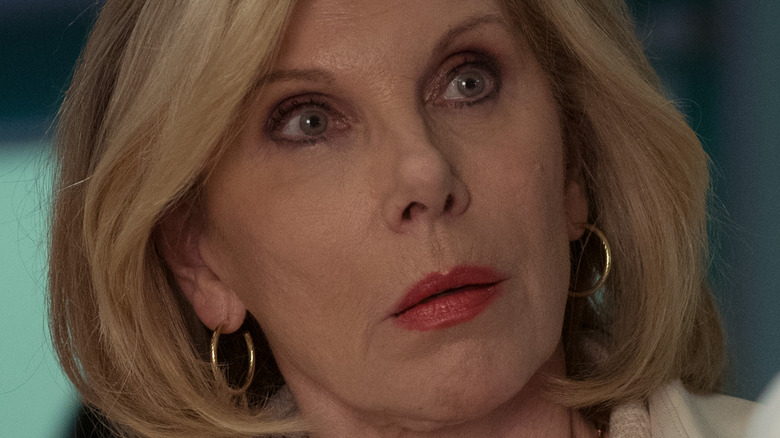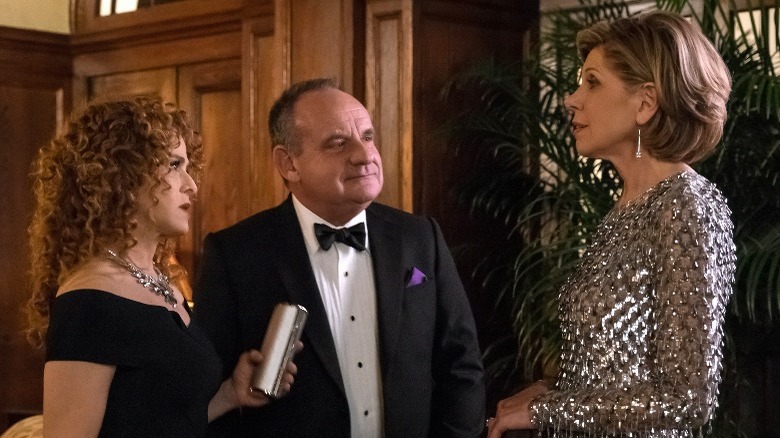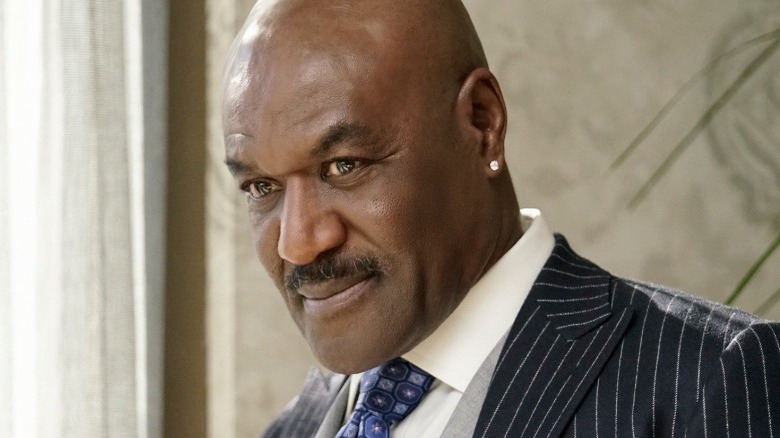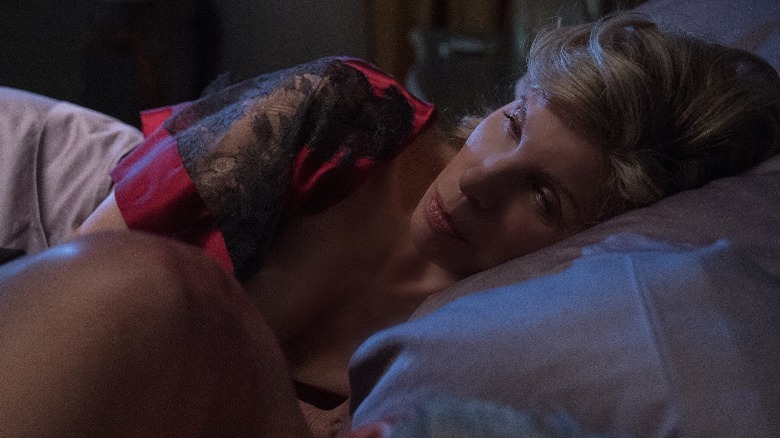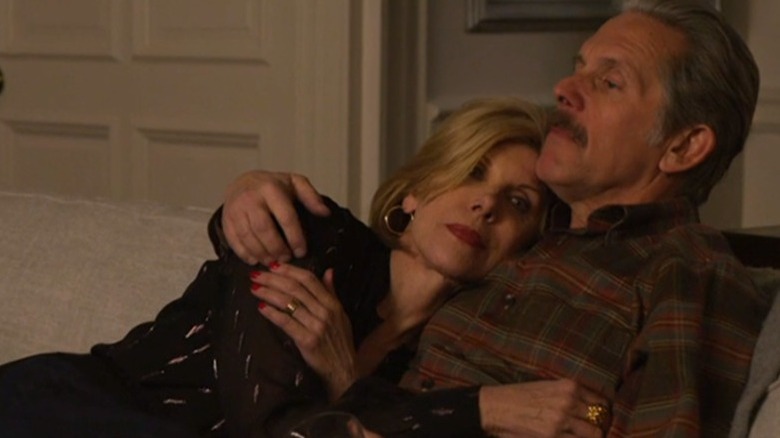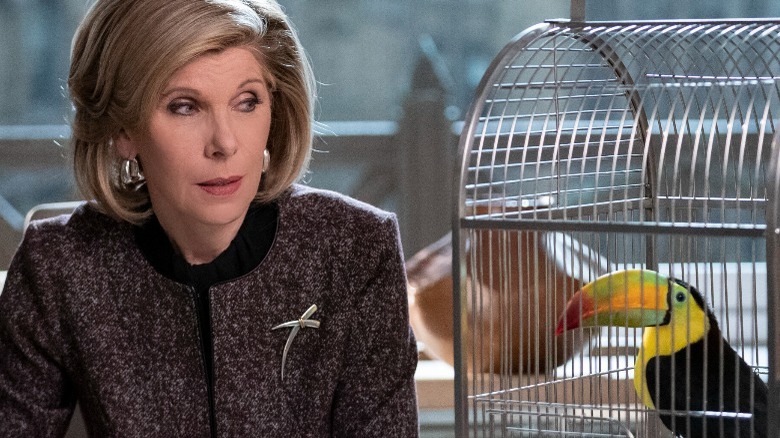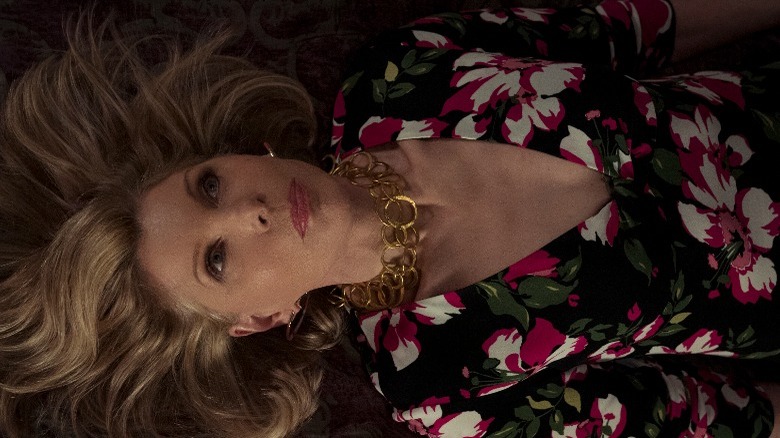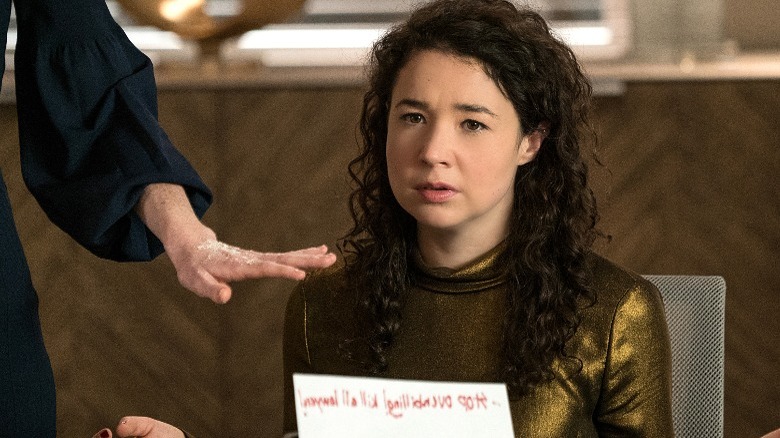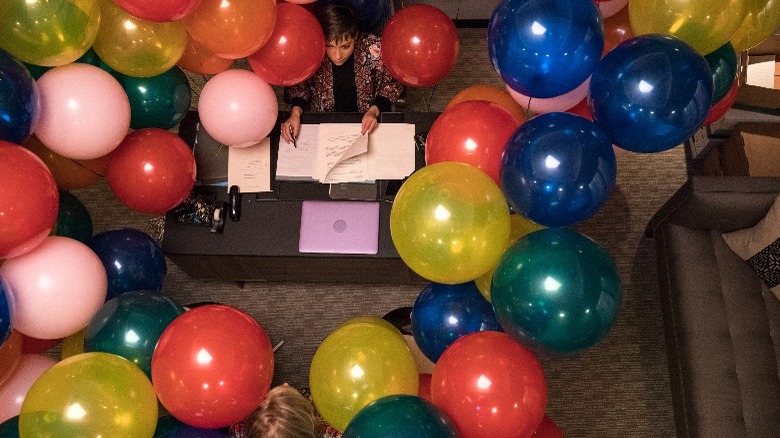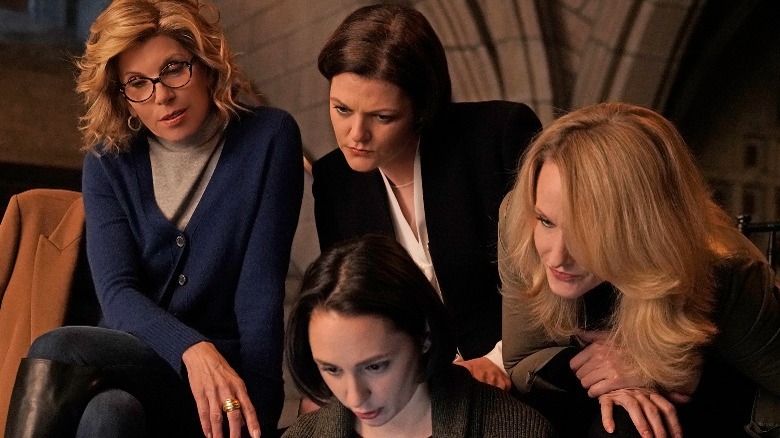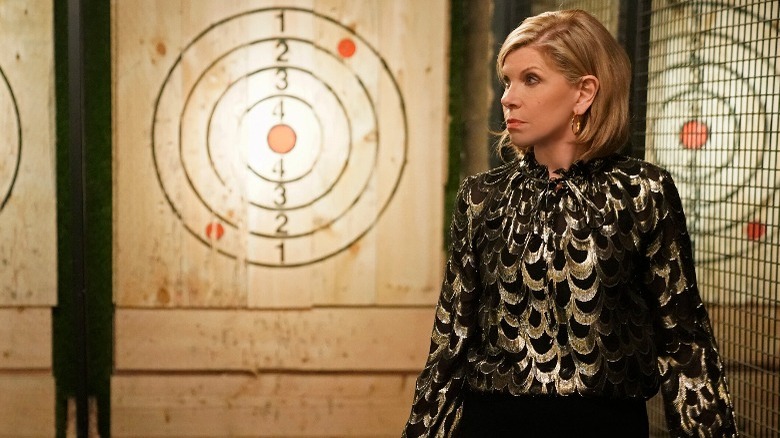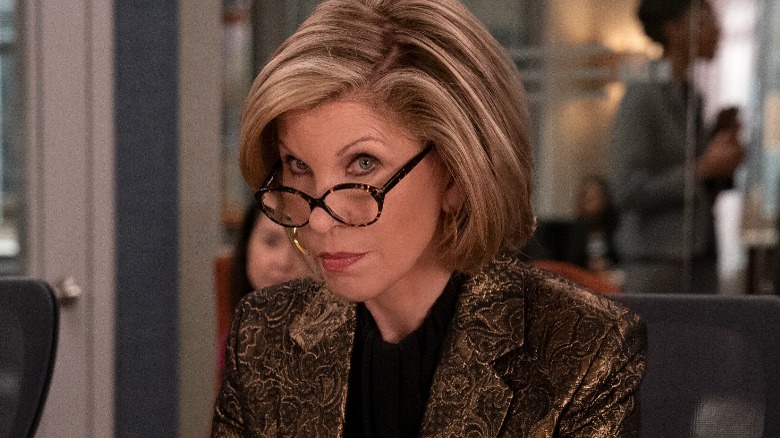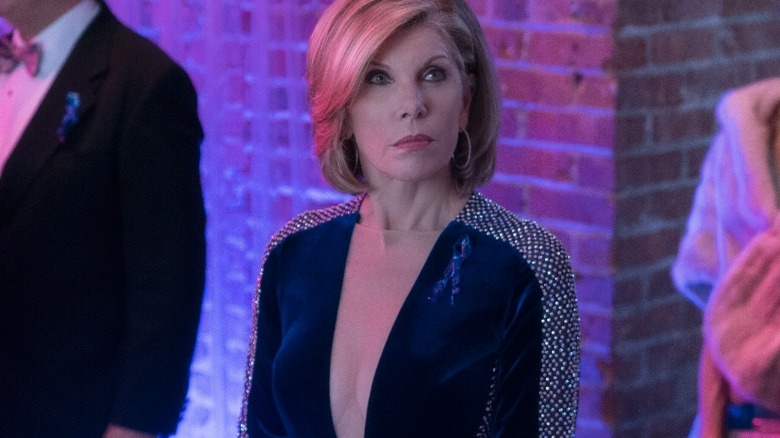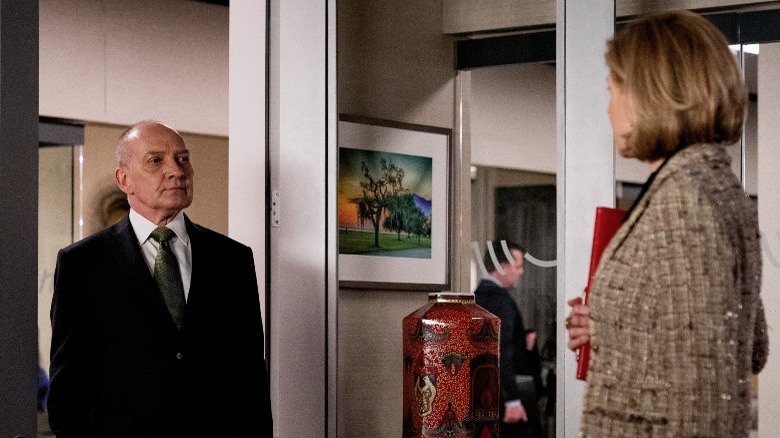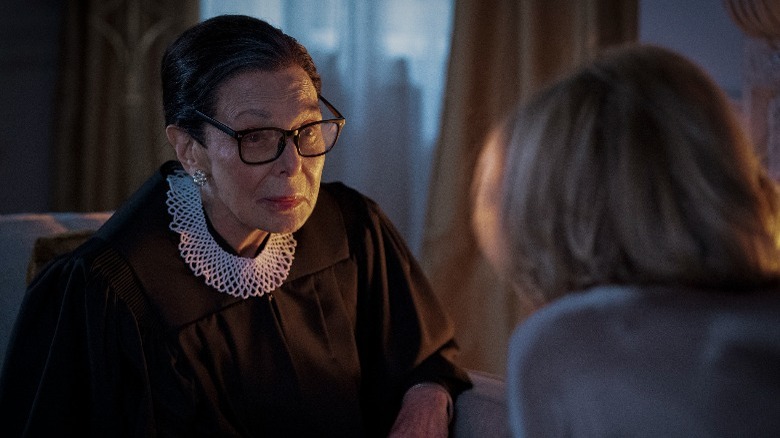Diane Lockhart's 7 Best And 7 Worst Moments From The Good Fight
Produced by husband and wife team Robert and Michelle King, the Paramount+ series "The Good Fight" picks up where "The Good Wife" left off. A spinoff and sequel series rolled into one, it follows the social justice-minded lawyer Diane Lockhart (Christine Baranski) as she tries to stay grounded amid the chaos while working for a historically Black law firm. The satirical series uses Diane as a focal point while critically examining leftist politics in post-Trump America.
As Baranski put it in the featurette "The Good Fight: A Farewell," the series sets out to be more than just a legal drama, instead exploring the question, "How do intelligent people live in a mad world?" It's a question that many have asked in recent years. And the answer, as those who watch the show will know, isn't always pretty. Let's take a look at Diane Lockhart's best and worst moments in "The Good Fight."
Worst: Diane loses her financial security
There's nothing like realizing that your hard work has paid off, as it seemingly has for Diane at the beginning of "The Good Fight." The series begins with the future looking pretty bright for the lawyer. After years of battling it out in the courtroom and within the world of law firm politics, she is ready to shut things down and move on with her life. After deciding she wants to put a down payment on a lovely villa in France, where she can work on her memoir and "take a deep breath," Diane announces her retirement plans to the other partners at her freshly-merged firm, telling them, "I'm ready to live my life."
After signing her exit paperwork, Diane just has to wrap up one last case. But before this can happen, she learns that she has lost all of her retirement savings in a Ponzi scheme, leaving her with a subsistence-level amount of money to live off. To make matters worse, her accountant tells her that her estranged husband Kurt's savings are also at risk unless they solidify their divorce. It's a bleak moment that leaves the otherwise idealistic and buttoned-up attorney feeling vulnerable and friendless.
Best: Diane joins Reddick and Boseman
When things don't work out with Diane's retirement and she changes her mind after giving her two-week notice, she finds herself in the unfortunate position of having to announce to the partners that she is reversing her retirement. Unfortunately, the firm is massive and awfully top-heavy after the recent merger, and it seems the partners are offering a no-take backs policy on her two weeks' notice, effectively pushing her out. Worse, because so many people lost money by taking Diane's financial advice, no other firm will hire her even with the promise that she'll bring her high-dollar clients with her.
Just when things are at their bleakest for the lawyer, Adrian Boseman (Delroy Lindo), who is on the other side of the case she's on, asks her to join him at his Reddick and Boseman, telling her, "I would much rather you help us beat them," getting her "back on the right side of things." It's a chance for the idealistic lawyer to start over working for a firm known for taking a stance on social justice issues. It's a triumphant moment that puts Diane in the type of law firm she should have been in all along.
Worst: Diane and Kurt get swatted
Diane's romance with Kurt McVeigh (Gary Cole) is more than just a love story for the ages. It also represents the civility that can exist between people who hold completely different political beliefs, something that seems in short supply these days. Diane first meets her "Marlboro Man" Kurt on "The Good Wife" when she hires him as a ballistics expert to consult on a case. The principled Diane immediately respects Kurt after learning that he will not testify on behalf of a guilty defendant. They eventually form a relationship based on mutual respect and directness that fans of the ship call "McHart."
The relationship sustains Diane when the world around her often seems to be spinning out of control through the events of "The Good Fight." That's why it's that much more devastating when their relationship and lives are put in jeopardy when the couple gets swatted — a dangerous and malicious prank wherein someone reports a crime with the goal of having a SWAT team invade a target's home — in the Season 3 finale of "The Good Fight." The terrifying event, based on the real-life swatting trend that gained notoriety when it led to the accidental killing of Andrew Finch (per CNN), pushes Diane into an alternate reality in her mind and leads her to believe that Kurt died.
Best: Diane and Kurt get back together
Nobody is perfect, not even McHart. As anyone who has been married for many years can attest to, it takes a lot of work to keep a relationship going through the years, and the ability to work together past mistakes is key. While Diane and Kurt's differences are part of their relationship from the beginning, being so far apart on so many things can also put a strain on their relationship. Toward the end of "The Good Wife," things get pretty rocky for Diane and Kurt, who spends a lot of his time with young, good-looking women who share his ideological beliefs as part of his job.
The season culminates in an electric courtroom moment where Lucca calls Kurt's testimony into question because of an affair he had with another ballistics expert. They're still split up at the beginning of "The Good Fight," but even after Diane pushes to finalize their divorce, it's clear that the pair understand each other better than anyone else could. Robert and Michelle King would later tell TVLine that they originally planned to split McHart up for good later in the series, but they couldn't bring themselves to do it. In Michelle's words, "Their relationship is, in some ways, aspirational; regardless of their disagreements they still support each other."
Worst: The firm gets satirized
One of the things Diane and Kurt can both agree on is that freedom of speech is essential to a democracy, even if that freedom of speech is occasionally used in ways that push the limits of what most people find tolerable. And one of the more divisive expressions of freedom of speech is satire, especially when the point and motivation for the satire aren't entirely clear. When one of Reddick and Boseman's clients finds himself and his divorce the subject of a satirical play, he is determined to sue for defamation.
At first, Adrian laughs it off, telling Lucca, "Satire just disappears if you don't give it any oxygen." But the gang soon realizes that the play was written by a former associate who was fired for drug use, so Adrian agrees to take the case. When Adrian goes to see the play, he finds himself seething at the portrayal of "Dana" and "Aiden" — clearly meant to satirize Diane and himself by imagining the former as a leather-clad white dominatrix in control of the Black firm in a story the Kings told Vulture was inspired by Jeremy O. Harris' "Slave Play." Although Diane is less incensed than others in the firm, her reaction to the play ironically serves to highlight many of the underlying racial tensions that the play attempts to emphasize, even if the playwright's primary motivation was spite.
Best: Diane gives up her name partnership at the firm
One of the common threads running through every season of "The Good Fight" is exactly how much space a white woman, no matter how much she considers herself an ally and advocate for social justice, can take up in a historically Black law firm. Some of the partners and associates have always had issues with Diane's place in the firm, but her husband's connections to participants in the January 6 insurrection only add fuel to the fire. When she finds herself backed into a corner, Diane takes the ugly step of compelling her more problematic clients to intervene on her behalf with STR Laurie, the firm that now owns Reddick, Boseman & Lockhart.
Her relationship with Liz becomes strained to near-breaking point under pressure from STR Laurie when the investors demand they find 10 percent in savings. Convinced the firm is "dysfunctional" after an unsettling Zoom meeting with a cat filter, the investors decide to fly in from Dubai unannounced and get things under control. The ensuing argument between Liz and Diane brings some of their issues to a head, with Liz questioning Diane's desire to remain a name partner for the firm. Fortunately, Diane comes to her senses by the end of Season 5 after a bizarre encounter with a religious pop-up court and a basement jail. She comes to realize that she's "the top Karen" but that she also enjoys the "Chutes and Ladders" of life. It's not quite a full recognition of exactly how privileged she's been, but it's progress nonetheless.
Worst: Diane opens a ricin letter
Compared to other jobs like firefighting and police work, a career in law is usually a pretty tame profession. But in the intensified reality of "The Good Fight," everything is treacherous to the point that the attorneys of Reddick and Boseman seem to be virtually non-reactive to the constant explosions in the background of Season 6, despite a fairly terrifying grenade threat. But it's not the first time they've found themselves in peril, so it's hardly a surprise that they've become desensitized to it. Back in Season 2 when lawyers began turning up dead, everyone was so severely on edge that they jumped when a judge used his gavel. So it should come as no surprise when Marissa opens a powder-filled envelope addressed to Diane.
The powder comes with a letter reading: "Kill all lawyers. I'm bankrupt. I've lost my wife. I've lost my kids. All because of you." The letter goes on to state that the powder is ricin and should be considered his final payment. Although Diane isn't the one to open the letter, the stress of knowing her clients are suspects makes for a miserable day at work. Fortunately, the entire scare turns out to be an associate's attempt to get more time for a case.
Best: Diane gets rid of her gun and shroom juice
One of the things that makes Kurt a perfect match for Diane is his desire to protect her without controlling her. A perfect example of this can be seen in Season 1, Episode 5 of "The Good Fight" ("Stoppable: Requiem for an Airdate"), when he asks her to read over his speech and thanks her with the gift of a gun. However, by Season 2, Diane, who has been micro-dosing psilocybin just a little too heavily for most of the season, is beginning to lose her cool.
In her drug-enhanced state, she made an off-hand comment about the political state of affairs in the U.S. that would come back to haunt her: "I have a Smith and Wesson 64 in my desk, and I'm this close to taking to the streets." That statement looks even worse when the FBI starts looking into Diane for her connection to a left-wing extremist. After Adrian is shot in Season 2 and things start to get out of control, she dumps her drugs down the sink and removes her gun from her desk, realizing that feeling calm and in control has only put her off her game.
Worst: Diane joins a terrorist group
Diane often takes drastic steps to feel like she has some degree of control over her life. When her experience with "the resistance" turns out to be a disappointing one, she gets a DL invite to a super-secret women's group. And, unlike the first group, these ladies have a clear, united focus: To lower Donald Trump's presidential approval rating enough that he will lose the 2020 election.
At first, an actionable approach to the status quo sounds pretty darned good, and Diane gets Liz involved. But as the "Book Club" continues to meet, their Machiavellian M.O. begins to take a darker turn. A member of the group asks them to gain access to voting software so they can dictate results to their liking. Eventually, they decide to resort to "fuller measures" by swatting Trump appointees, and it's a bridge too far for Diane, who ends up a target of the group herself after quitting.
Best: Diane picks up a hobby
While it's true that Diane copes with the state of the world by consuming booze, psilocybin, cannabis gummies, and ketamine at various stages, she also blows off steam with the occasional hobby. And every time she picks up a new hobby, it's glorious, since Diane isn't the kind of gal who settles for calming pastimes like scrapbooking or cross-stitch. She trains in aikido at one stage and even gets called out by her sensei for hitting too hard. And when she finds she needs a better outlet for her bottled-up rage, the attorney takes up a new hobby: throwing axes.
This turns out to be a much better pastime, and she enjoys it so much she eventually invests in her own high-end ax. In Season 4, Diane takes up a slightly more relaxing hobby: filling up notebooks with dots. She gets the idea from Roisin Orbinson (Annaleigh Ashford) in "The Gang Goes to War" (Season 4, Episode 5). The lawyer tells her she finds the habit relaxing, and while it isn't quite as cool as aikido or ax throwing, it works.
Worst: Diane imagines a world where Trump lost
As a stand-in for the good and bad of white liberal feminism, Diane spends a lot of time lamenting Donald Trump's ascension to the presidency in 2017. So when she finds herself in a world where Trump was never elected, she is quick to break open the bubbly and celebrate. But it doesn't take long before she begins to see cracks in the façade of this brave new world. Because Trump was never elected, the women of the United States never get angry enough to form the #MeToo movement, and, worse still, Harvey Weinstein is one of the firm's clients — and even won the Presidential Medal of Freedom. He is also using his liberal connections to shield himself from accusations of rape.
Diane quickly finds herself in a wiki hole chasing down the alternative facts of this new reality, and it's not pretty. She learns that the increase in corporate taxes under a Hillary presidency is hitting their clients hard, and the firm has to either take on sketchy clients or consider dissolution or bankruptcy. The entire experience leads her to conclude that "Justice is an equation. Justice equals the law times the zeitgeist. The law on its own doesn't stand up. You need the mood of the times on your side."
Best: Diane imagines a world where Trump lost
Before she begins to realize the double-edged sword of Trump's election to office, Diane gets to bask in the glory of life with a Hillary Clinton presidency, and for a hot minute it's pretty glorious. In this alternate universe, she believes the Trump presidency was only a dream. Diane finds herself three years into the Clinton presidency and set to argue before a Supreme Court that includes Justice Elizabeth Warren before speaking with a group called Women Unite For Change — a darned sight better than her Book Club.
As she dances in her office, she flips through the news to learn that there's a cure for cancer in the works, the rainforests have been saved, Harriet Tubman is on the $20 bill, and the polar bear population is finally in the clear. After years of living in a world where chaos reigns supreme, she finds herself positively delighted to be watching the news, even if that joy is short-lived.
Worst: Diane makes a power play that backfires
From the moment Diane joins Reddick and Boseman, she struggles to navigate the racial politics of working as a white name partner in a historically Black law firm. In many ways, this relationship functions as a crash course in intersectionality, allyship, and the various pitfalls that can arise in the space between the two. As a woman in law, Diane has had to fight harder than her male counterparts to prove she can stand on equal footing. Adrian invited her into the firm, and she negotiated her name partnership as part of that deal, but it didn't sit well with everyone.
There's an uncomfortable moment at the Black Lawyers Association when Diane is introduced as a leader of one of the top four Black Chicago law firms. When the firm installs a group chat, the discontent at the "Diane situation" becomes all too clear as anonymous posters demand the partners vote out the "white supremacist." When Liz tells her the partners think she should step down, a defiant Diane pulls a downright dirty power move, telling the high-dollar clients she knows to be racist that she will be passing them off to Black associates to encourage them to call and demand she stay a name partner. The bid works, but it's a very bad look for Diane.
Best: Diane sees RBG
The inner turmoil that Diane experiences while deciding whether she should remain a name partner is representative that she is on the right path, trying to learn and grow from her mistakes. One of the ways she works through these issues is by using her very keen intellect and vivid imagination to manifest her internal discourse visually, like when she imagines a fireside conversation with her hero Ruth Bader Ginsburg in her apartment.
When Diane notices the Supreme Court justice in her apartment, she asks her for help with her decision. RBG talks about how she was asked to step aside many times during her career: When she was in law school, when she started a family, when she was appointed to the Court of Appeals and Supreme Court. RBG urges her not to step aside, and even though the Collared One is simply a manifestation of her own will, Diane seems genuinely happy to hear the message. It's just unfortunate she takes another few episodes to realize she doesn't have to be a name partner to help women.
